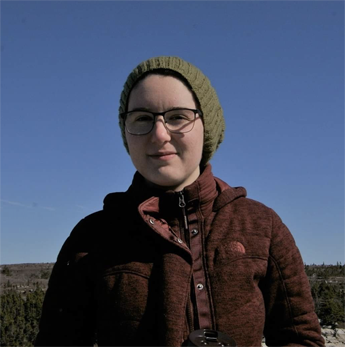This article is part of a series focusing on the grads of the ∫⁄¡œ≥‘πœÕ¯Class of 2021. Visit our Class of 2021 virtual space to share in the excitement with our newest graduates.
Riley Nielson-Baker completed their Master of Public Administration (MPA) during a global pandemic. They did so while launching and chairing the Atlantic chapter of Democrats Abroad, competing in the National Annual Public Administration Case Competition, keeping a part-time job and coming out as non-binary. A month before the completion of their classes they had already secured a position with the Nova Scotia Provincial Department of Justice. ¬Ý

‚ÄúI was born in Halifax, grew up along the southern Maine‚ÄìNew Hampshire border and then I spent the last 10 years in South Florida.‚Äù Riley completed their bachelor‚Äôs degree in Public Administration at Florida Atlantic University in 2018. ¬Ý
In the summer leading up to their master's program, Riley was offered a job with the Department of Education in early childhood development to work in the English as an Additional Language Program, ‚Äúbasically providing support to newcomers and their families to help them navigate the educational system.‚Äù After working there a few months Riley was offered a contract extension doing data analysis with SchoolsPlus, a counselling and resource service for students across the province.¬Ý
Riley began the master's degree before COVID-19 hit and, reflecting on their experiences before and after the outbreak, stated that it was “twice as exhausting. I’m learning less while working twice as hard.”
Handling curveballs
The pandemic threw another curveball Riley‚Äôs way in the spring of 2020. They were about to start an internship with the Department of National Defense when the offer was rescinded. ¬Ý
They were not the only one in that situation, and the MPA office helped them figure out an alternative way to get the valuable experience the MPA internship offers. ‚ÄúI was very fortunate: my program and my job [at SchoolsPlus] worked together and kept me on full time for the summer.‚Äù ¬Ý
Riley’s internship involved “analyzing gaps in the education system that helped contribute to a briefing note to address those gaps.”
Riley also faced challenges related to their identity as a non-binary person. Riley shares, “I’ve been out for two years but I wasn’t out in my program. I wanted to establish myself first.” They received support after coming out to people in their program, but that didn’t mean everything went smoothly. Riley recalls that coming out to a professor “was a non-issue” but when a co-worker who they weren’t out to misgendered them in front of him "he really didn’t know what to do.”
A safe environment
Overall, Riley‚Äôs experience in the MPA program was a good one. When asked what their advice is for incoming students with LGBTIA2S+ identities, Riley said, ‚ÄúCome because they are good people. And you‚Äôll be able to get an education in a safe environment that respects your identity and will stand up for you and protect you.‚Äù ¬Ý
“It’s rare and I got lucky, it’s not perfect but it’s good. They are willing to learn, they recognize their biases, and they are willing to work on them.”
Riley is currently working with the Provincial Department of Justice. “I am a program coordinator for the independent legal advice program that provides 2–3 hours of free legal advice—not representation—for victims of sexual assault in the province. I’m working on improving the program by improving data collection, access, representation and just overall knowledge of the program. Like outreach, so we can provide more comprehensive services to more survivors.”
‚ÄúIt‚Äôs part-time permanent, unionized, in a field that I‚Äôm interested in. It‚Äôs a great environment, a really good group, really diverse, which is nice.‚Äù ¬Ý
Now Riley is getting ready for their next big challenge: ‚ÄúI recently got an offer to join the ∫⁄¡œ≥‘πœÕ¯Political Science master‚Äôs program and work on a research project with them.‚Äù
